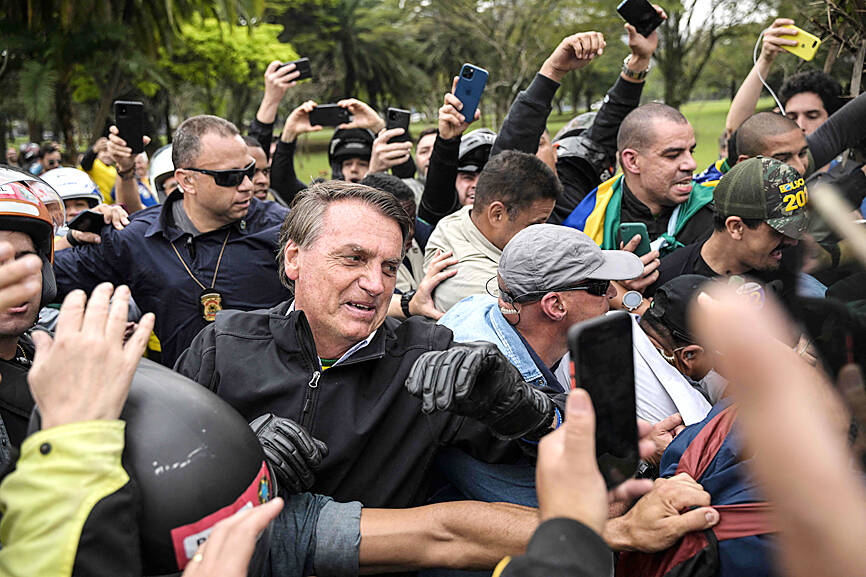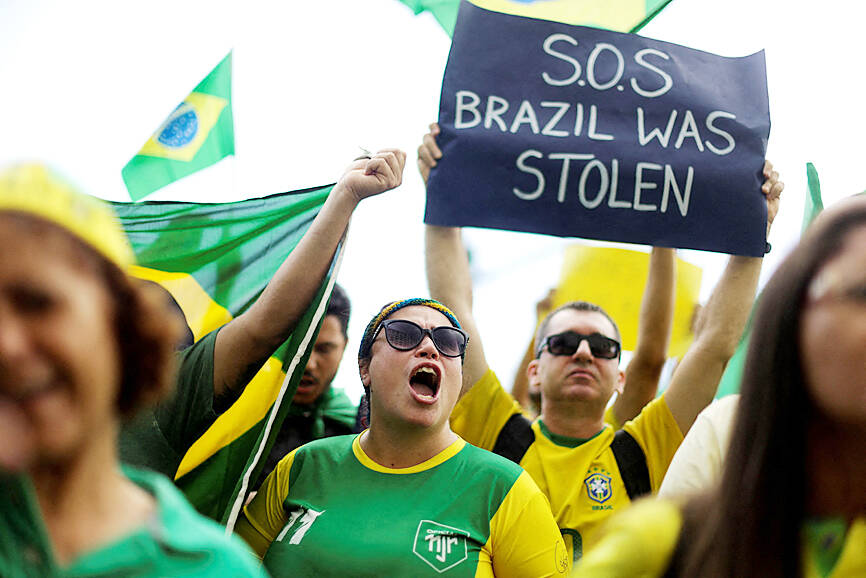The head of Brazil’s electoral authority on Wednesday rejected a request from Brazilian President Jair Bolsonaro’s political party to annul ballots cast on most electronic voting machines in the Oct. 30 presidential election that it said would have overturned its result.
Brazilian Supreme Federal Court Justice Alexandre de Moraes had previously issued a ruling that implicitly raised the possibility that Bolsonaro’s Liberal Party could suffer from such a challenge.
He conditioned analysis of the request on the presentation of an amended report to include results from the first electoral round on Oct. 2, in which the party won more seats in both congressional houses than any other, and he established a 24-hour deadline.

Photo: AFP
Earlier on Wednesday, Liberal Party President Valdemar Costa and lawyer Marcelo de Bessa held a news conference and said there would be no amended report.
“The complete bad faith of the plaintiff’s bizarre and illicit request ... was proven, both by the refusal to add to the initial petition and the total absence of any evidence of irregularities and the existence of a totally fraudulent narrative of the facts,” De Moraes wrote in his decision hours later.
He also ordered the suspension of government funds for the Liberal Party’s coalition until a fine of 23 million reais (US$4.29 million) for bad faith litigation is paid.

Photo: REUTERS
On Tuesday, De Bessa filed a 33-page request on behalf of Bolsonaro and Costa citing a software bug in the majority of Brazil’s machines — they lack individual identification numbers in their internal logs — to argue that all votes they recorded should be nullified.
De Bessa said that doing so would leave Bolsonaro with 51 percent of the remaining valid votes.
Neither Costa nor De Bessa have explained how the bug might have affected election results.
Independent experts consulted by The Associated Press said that, while newly discovered, it does not affect reliability and each voting machine is still readily identifiable through other means.
In his ruling, De Moraes noted the same.
He also wrote that the challenge to the vote appeared aimed at incentivizing anti-democratic protest movements and creating tumult, and ordered the investigation of Costa and the consultant hired to conduct an evaluation.
“De Moraes’ message to the political establishment is: The game is over. Questioning the result of the elections is not fair play, and people and institutions who do that will be punished harshly,” said Mauricio Santoro, a political science professor at the State University of Rio de Janeiro.
In the news conference on Wednesday, Costa said his intention is merely to prevent the results of the vote from haunting Brazil into the future.
The electoral authority on Oct. 30 ratified the victory of Bolsonaro’s nemesis, leftist former Brazilian president Luiz Inacio Lula da Silva, and even many of the president’s allies quickly accepted the results.
Protesters in cities across the country have steadfastly refused to do the same, particularly with Bolsonaro declining to concede.
Bolsonaro spent more than a year claiming Brazil’s electronic voting system is prone to fraud, without ever presenting evidence.
The South American nation began using an electronic voting system in 1996, and election security experts consider such systems less secure than hand-marked paper ballots, because they leave no auditable paper trail.
However, Brazil’s system has been closely scrutinized by domestic and international experts, who have never found evidence of it being exploited to commit fraud.

Auschwitz survivor Eva Schloss, the stepsister of teenage diarist Anne Frank and a tireless educator about the horrors of the Holocaust, has died. She was 96. The Anne Frank Trust UK, of which Schloss was honorary president, said she died on Saturday in London, where she lived. Britain’s King Charles III said he was “privileged and proud” to have known Schloss, who cofounded the charitable trust to help young people challenge prejudice. “The horrors that she endured as a young woman are impossible to comprehend and yet she devoted the rest of her life to overcoming hatred and prejudice, promoting kindness, courage, understanding

‘DISRESPECTFUL’: Katie Miller, the wife of Trump’s most influential adviser, drew ire by posting an image of Greenland in the colors of the US flag, captioning it ‘SOON’ US President Donald Trump on Sunday doubled down on his claim that Greenland should become part of the US, despite calls by the Danish prime minister to stop “threatening” the territory. Washington’s military intervention in Venezuela has reignited fears for Greenland, which Trump has repeatedly said he wants to annex, given its strategic location in the arctic. While aboard Air Force One en route to Washington, Trump reiterated the goal. “We need Greenland from the standpoint of national security, and Denmark is not going to be able to do it,” he said in response to a reporter’s question. “We’ll worry about Greenland in

PERILOUS JOURNEY: Over just a matter of days last month, about 1,600 Afghans who were at risk of perishing due to the cold weather were rescued in the mountains Habibullah set off from his home in western Afghanistan determined to find work in Iran, only for the 15-year-old to freeze to death while walking across the mountainous frontier. “He was forced to go, to bring food for the family,” his mother, Mah Jan, said at her mud home in Ghunjan village. “We have no food to eat, we have no clothes to wear. The house in which I live has no electricity, no water. I have no proper window, nothing to burn for heating,” she added, clutching a photograph of her son. Habibullah was one of at least 18 migrants who died

Russia early yesterday bombarded Ukraine, killing two people in the Kyiv region, authorities said on the eve of a diplomatic summit in France. A nationwide siren was issued just after midnight, while Ukraine’s military said air defenses were operating in several places. In the capital, a private medical facility caught fire as a result of the Russian strikes, killing one person and wounding three others, the State Emergency Service of Kyiv said. It released images of rescuers removing people on stretchers from a gutted building. Another pre-dawn attack on the neighboring city of Fastiv killed one man in his 70s, Kyiv Governor Mykola